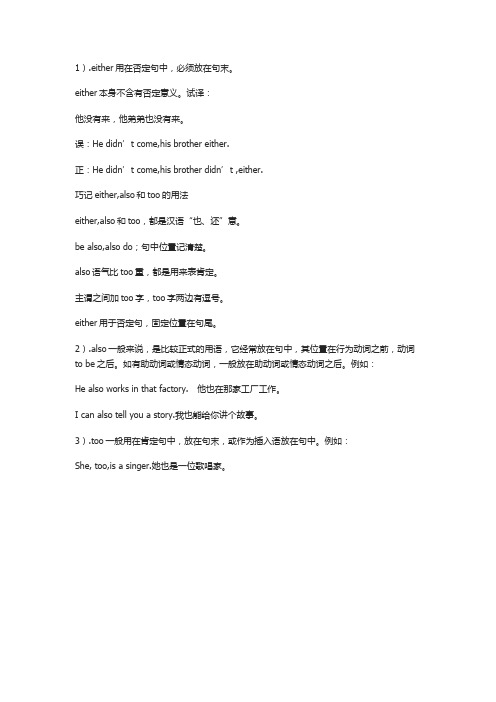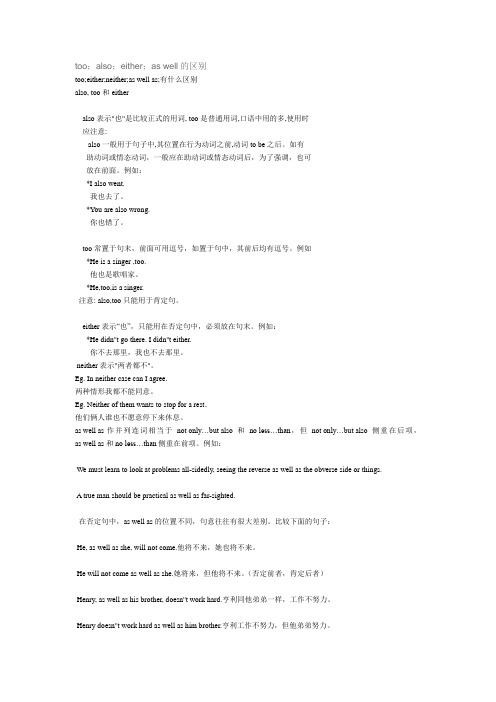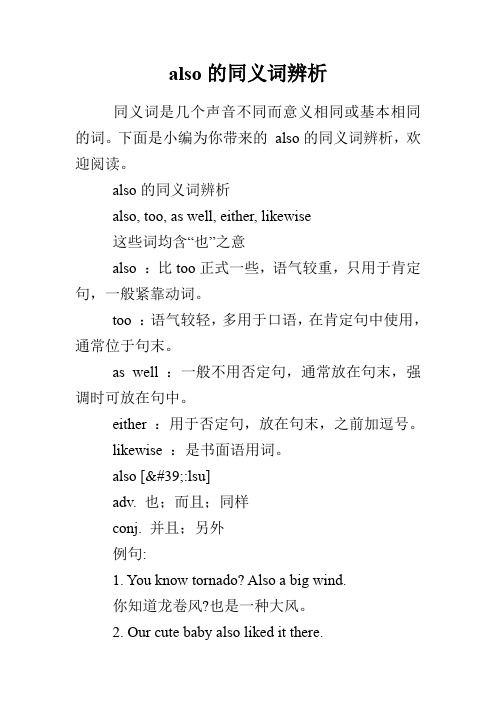also,too,either的使用区别
also, too, either, as well的区别

also, too, either, as well的区别(最新版)编制人:__________________审核人:__________________审批人:__________________编制单位:__________________编制时间:____年____月____日序言下载提示:该文档是本店铺精心编制而成的,希望大家下载后,能够帮助大家解决实际问题。
文档下载后可定制修改,请根据实际需要进行调整和使用,谢谢!并且,本店铺为大家提供各种类型的经典范文,如词性大全、句法大全、句型大全、从句大全、时态大全、语态大全、语法大全、虚拟语气、用法辨析、其他资料等等,想了解不同范文格式和写法,敬请关注!Download tips: This document is carefully compiled by this editor.I hope that after you download it, it can help you solve practical problems. The document can be customized and modified after downloading, please adjust and use it according to actual needs, thank you!In addition, this shop provides you with various types of classic sample essays, such as part of speech, syntax, sentence pattern, clause, tense, voice, grammar, subjunctive, usage analysis, other materials, etc. If you want to know the different formats and writing methods of the model essay, please pay attention!also, too, either, as well的区别这四个副词均可表示“也”,区别如下:1. too 和 as well 多用于口语中,语气较轻,通常用于肯定句或疑问句,一般不用于否定句,且通常放在句末。
too和either的区别

1).either用在否定句中,必须放在句末。
either本身不含有否定意义。
试译:
他没有来,他弟弟也没有来。
误:He didn’t come,his brother either.
正:He didn’t come,his brother didn’t ,either.
巧记either,also和too的用法
either,also和too,都是汉语“也、还”意。
be also,also do;句中位置记清楚。
also语气比too重,都是用来表肯定。
主谓之间加too字,too字两边有逗号。
either用于否定句,固定位置在句尾。
2).also一般来说,是比较正式的用语,它经常放在句中,其位置在行为动词之前,动词to be之后。
如有助动词或情态动词,一般放在助动词或情态动词之后。
例如:
He also works in that factory. 他也在那家工厂工作。
I can also tell you a story.我也能给你讲个故事。
3).too一般用在肯定句中,放在句末,或作为插入语放在句中。
例如:
She, too,is a singer.她也是一位歌唱家。
too also either neither的区别

too also either neither的区别摘要:1.介绍too、also、either和neither的含义和用途2.分析too和also的异同3.探讨either和neither在用法上的区别4.总结四个词的适用场景和注意事项正文:在日常英语写作和口语中,too、also、either和neither这四个词经常被混淆。
下面我们将逐一解析这些词的含义、用法以及它们之间的区别。
首先,too和also都表示“也”,用于强调某人或某物也具有某种特征或行为。
然而,它们的用法略有不同。
too通常放在句尾,表示对前面所述内容的补充,而also可以放在句子的任何位置。
例如:1.She is a talented artist.-> She is also a talented writer.(她也是一个有才华的作家。
)2.I like reading.-> I also like playing chess.(我也喜欢下棋。
)接下来,我们来看看either和neither。
这两个词主要用于表达选择和排除。
either表示“(两者之中)任何一个”,常用于肯定句中;而neither表示“(两者都不)”,用于否定句中。
例如:1.You can choose either this book or that one.(你可以选择这本书或那本书。
)2.I don"t like neither of the movies.(我不喜欢这两部电影中的任何一部。
)在使用这四个词时,请注意以下几点:1.too和also可用于肯定句,但too需放在句尾;2.either和neither用于选择和排除,either表示“任何一个”,neither 表示“都不”;3.either可以单独使用,而neither需要与not连用;4.避免在一个句子中同时使用too和either,以免造成混淆。
总之,掌握too、also、either和neither这四个词的含义和用法,有助于提高我们的英语表达能力。
tooeitheralso的用法和区别

tooeitheralso的用法和区别"Too", "either"和"also"都是英语中常见的副词,它们在句子中有着不同的用法和含义。
1. "Too" (也/太):- 当"too"用于表示也时,它可以放在句子中一个肯定句的末尾,用来加强陈述。
例如:I like pizza too.(我也喜欢披萨。
)- 当"too"用于表示过度的意思时,它通常放在形容词或副词的前面,用来描述一些事物的程度超过了正常或期望的范围。
例如:The coffee is too hot to drink.(咖啡太烫了,无法喝。
)- "too"也可以用在肯定句的前面,表示"也"。
此时,句子中常使用倒装结构。
例如:Too difficult is the problem for me to solve.(对我来说这个问题也太难了。
)- "too"可以作为连词,引导结果状语从句,表示一个结果使一些行为变得困难或不可能。
例如:She overslept, too, which made her arrive late to work.(她也睡过头了,这使她上班迟到了。
)2. "Either" (也/两者之一):- "either"表示在两个或多个人、物或观点中的一个。
例如:You can choose either red or blue.(你可以选择红色或蓝色。
)- "either"可以放在句子中一个否定句的末尾,表示"也"。
例如:I don't like coffee either.(我也不喜欢咖啡。
)- "either"也可以引导让步状语从句,表示出乎意料的结果。
also,too,either的使用区别

also, too, either, as well的区别1、too 与as well 多用于口语中,语气较轻,通常用于肯定句或疑问句,一般不用于否定句,且通常放在句末。
如:I like you too [as well]、我也喜欢您。
Are they coming too [as well]? 她们也来不?too 有时也紧跟在主语后(注:as well 不这样用),此用法较正式。
如:I, too, know where he lives、我也知道她住在什么地方。
在Me too, You too 这类简略答语中,通常不用as well, also。
如:A:I’m tired、我累了。
B:Me too、我也就是。
2、also 比too 与as well 正式,一般也不用于否定句,它在句中的位置通常就是紧靠动词,即放在行为动词之前,特殊动词之后。
有时为了强调也放在句末(但不常见)。
如:He also came、/ He came also、她也来了。
She is young and beautiful,and also rich、她年轻漂亮,而且有钱。
also 有时用于句首(其后通常有逗号),相当于连词and。
如:Also,his mother was dead、再说,她母亲又过世了。
3、either(也)通常只用于否定句,且要放在句末。
如:I don’t know, either、我也不知道。
He hasn’t finished it,either、她也还没有做完。
注:有时在肯定句之后跟一个否定句,可能用too,also。
如:He came, but she didn’t also came、她来了,但她没有也一起来。
He went to Washington, but not to New York too、她去了华盛顿,但并不就是也去了纽约。
比较:He didn’t buy a computer, and she didn’t either、她没有买电脑,她也没有买。
英语中“也”的用法

1.also, too, either, as wellalso,too,either和aswell都含有“也"的意思,在句中作状语。
但用法各异。
also 用法比较正式,含较庄重色彩,只能用于肯定句中,不与否定式动词连用。
通常用于主要动词之前,助动词之后,但若主要动词是be,则置于其后。
例如: I was at her birthday party, and he was also there.我参加了她的生日聚会,而他也参加了。
She not only plays well, but also writes music.她不仅很会演奏,而且还会作曲。
I've met Jane and I've also met her mother.我已见到简,我也见到了她的母亲。
too常用于口语中,且语气较轻。
可与also通用,但不如also 正式。
用于肯定句,通常置于句末,但要用逗号将前后两部分隔开。
作插人语时置于句中。
例如: YouknowthewayandIknowit,too.你知道路,我也知道。
He plays the guitar and sings,too.他会弹吉他,也会唱歌。
Mr. Smith has expressed his support. I, too,willdo what I cando for you.史密斯先生已表示支持你们,我也将为你们做出我能够做的一切。
-Me, too!我也有了!either只能用于否定句,含...也(不)”的意思。
在否定句中,用no.t--either 表示这种增加的成分。
常放在从句最后面,有时置于句中,表示强调,但不能置于句首。
例如:They haven't phoned and they haven’t written either.他们没来过电话,而且也没来过信。
I don't like this hat, and I don't like that oneeither.我既不喜欢这顶帽子,也不喜欢那顶帽子。
如何区别also, too, either与as well

如何区别also, too, either与as well(最新版)编制人:__________________审核人:__________________审批人:__________________编制单位:__________________编制时间:____年____月____日序言下载提示:该文档是本店铺精心编制而成的,希望大家下载后,能够帮助大家解决实际问题。
文档下载后可定制修改,请根据实际需要进行调整和使用,谢谢!并且,本店铺为大家提供各种类型的经典范文,如词性大全、句法大全、句型大全、从句大全、时态大全、语态大全、语法大全、虚拟语气、用法辨析、其他资料等等,想了解不同范文格式和写法,敬请关注!Download tips: This document is carefully compiled by this editor.I hope that after you download it, it can help you solve practical problems. The document can be customized and modified after downloading, please adjust and use it according to actual needs, thank you!In addition, this shop provides you with various types of classic sample essays, such as part of speech, syntax, sentence pattern, clause, tense, voice, grammar, subjunctive, usage analysis, other materials, etc. If you want to know the different formats and writing methods of the model essay, please pay attention!如何区别also, too, either与as wellalso, too, either与as well 均可表示“也”,用法及其区别分述如下:1. too 和 as well两者多用于口语中,语气较轻,通常用于肯定句或疑问句,一般不用于否定句,且通常放在句末。
tooeitheralso的用法和区别

tooeitheralso的用法和区别
either,too,also的区别为:指代不同、语法不同、侧重点不同。
一、指代不同
1、either:(用于否定词组后)也。
2、too:(用于形容词和副词前)也。
3、also:此外;也。
二、语法不同
1、either:either作代词时,意为“(二者之中)任何一个”,在句中作主语或宾语,表示单数概念; 作主语时谓语动词一般用单数形式,但在否定句中常用复数形式。
2、too:too的基本意思是“也”“还”“而且”,用于肯定句,否定句用either。
3、also:also是较正式的用词,多用于书面语,基本意思是“也”“还”,表示两件事的性质相近或两件事情发生的时间相同,也可表示刚说过的话也适用于另一个人或物。
三、侧重点不同
1、either:either用于否定句,放在句末,之前加逗号。
2、too:too语气较轻,多用于口语,在肯定句中使用,通常位于句末。
3、also:also比too正式一些,语气较重,只用于肯定句,一般紧靠动词。
also,too 和 either 的用法区别习题(答案及解析)

三者都有”也“的意思,其中 also 和 too 可以以相同的方式使用。
然而,我们把它们放在不同的地方,在肯定句中使用 also 和 too,而在否定句中则使用 either。
其中,also 放在 be 动词和在情态动词之后,实义动词之前,而 too 放在句尾,此时它的意思跟 also 一样,所以解答此类的题目,只需判断句型或位置就可以了。
一、用 also,too 或 either 完成下列句子1、I don’t like cold climates. I don't think you like it _____.2、My friends are going to college next year. I am _____ going to college next year.3、My wife is a diligent engineer. I am a diligent engineer _____.4、I love swimming. My son loves it _____.5、Today the weather isn't so good. It wasn't really good yesterday _____.6、I eat a lot more than an average person. My brother _____ eats a lot.7、A bear can run very fast. A tiger runs very fast _____.8、I am not from Italy. My friend isn't from Italy _____.9、Paris is a big city. Madrid is _____ a big city.10、French is a difficult language to learn. Latin is a difficult language to learn _____.11、Henry is very athletic. He loves swimming, surfing, snowboarding and skiing. Jason _____ loves to swim and surf, but he hates all winter sports because he can't stand cold weather.12、I am taking a great art history class at the junior college downtown. Sarah is in the class _____. We both love it.13、I don't really like tomatoes. My brother doesn't like them _____.14、I am really tired, and I don't feel like going out tonight _____. Let's just stay home tonight.15、I don't really feel like going out tonight, and I am _____ really tired. Let's just stay home tonight.二、答案及解析1、either解析:在否定句(don't)中用 either。
either和too和also和so的区别

either,too,also,so这四个词都是副词,都含有 也的意思,可是它们的具体含义和用法却有比较明显的区别。
只能用在否定句中,常常和否定词not连用,用来否定词组或句子,其含义表示 也不 ,在一般情况下只能放在句末来加强整个句子的语气。
例如: She isn t likely to agree,either.她也不会同意的。
won t be in and won t (be) either.格林先生不在,史密斯先生也不在.表示 也 还 而且 ,常表示与某人做同样的事,也常用于非正式语体或口语中。
too通常放在句末或单词、词组之后,其语气较轻。
在句子中,too用作插入语时,前后应用逗号隔开,此时too与also可以替换。
too放在句末,表示强调谓语或宾语,当too放在形容词、副词之前,其含义表示 太 过于 ,too的用法比also更多些。
如: He can sing and dance, too.他会唱歌,也会跳舞。
That skirt is abit too short forher daughter.那条裙子对她女儿而言是太短了点儿。
You,too,may have a try.你也可以试一试。
Too the children will find in the book a lot of interesting pictures. 孩子们还能在书里面看到许多有趣的图片。
They also work in the hospital.=They work in the hospital,too.他们也在医院工作.3.在书面语里,also比too较为正式,also的语气较强,它的含义是 而且......还表示 此外还 也等含义,有时 also也表示 同样地的含义。
在口语中,also可以和too替换使用,但是,要注意also和too在句子中的位置不同。
also和常用的副词在句子中的位置相同,一般放在实意动词之前或系动词之后,有时放在整个谓语动词之前,有时也放在句首或句末用来修饰整个句子。
also, too, either, as well的区别

also, too, either, as well的区别这四个副词均可表示“也”,区别如下:1.too 和as well 多用于口语中,语气较轻,通常用于肯定句或疑问句,一般不用于否定句,且通常放在句末。
如:I like you too [as well]. 我也喜欢你。
Are they coming too [as well]? 他们也来吗?too 有时也紧跟在主语后(注:a s well 不这样用),此用法较正式。
如:I, too, know where he lives. 我也知道他住在什么地方。
在Me too, You too 这类简略答语中,通常不用as well, also。
如:A:I’m tired. 我累了。
B:M e too. 我也是。
2.also 比too 和as well 正式,一般也不用于否定句,它在句中的位置通常是紧靠动词,即放在行为动词之前,特殊动词之后。
有时为了强调也放在句末(但不常见)。
如:He also came. / He came also. 他也来了。
She is young and beautiful,a nd also rich. 她年轻漂亮,而且有钱。
also 有时用于句首(其后通常有逗号),相当于连词and。
如:Also,h is mother was dead. 再说,他母亲又过世了。
3.either(也)通常只用于否定句,且要放在句末。
如:I don’t know, either. 我也不知道。
He hasn’t finished it,e ither.他也还没有做完。
注:有时在肯定句之后跟一个否定句,可能用too,a lso。
如:He came, but she didn’t also came. 他来了,但她没有也一起来。
He went to Washington, but not to New York too. 他去了华盛顿,但并不是也去了纽约。
also,either,too的用法

also,either,too的用法Also, Either, Too 的用法•Also 用法–用法一:也,还•例句:I like coffee, and I also enjoy tea.•解释:also 在句子中表示“也”,用于表示除前面提到的事物之外,还有其他同样的事物或情况。
–用法二:而且,此外•例句:He is smart. Also, he is very friendly.•解释:also 在句子中起补充而不属于主要内容的作用,用于引入一个附加的观点或信息。
–用法三:也是,同样地•例句:I am also interested in learning French.•解释:also 在句子中表示与前面提到的事物有同样的状态或情感,用于强调与前面的情况的相似性。
•Either 用法–用法一:要么•例句:You can either choose the red one or the blue one.•解释:either 在句子中用于表示两者中的任选一项,常与 or 连用。
–用法二:也•例句:I don’t like coffee. She doesn’teither.•解释:either 在句子中用于表示与前面的情况或观点相同,相当于 also 或 too 的意思。
–用法三:(否定句中替代 also)•例句:He doesn’t like coffee, and I don’teither.•解释:either 可以用于否定句中,表示与前面的情况相同,避免重复使用 not。
•Too 用法–用法一:也•例句:I like swimming, and my sister does too.•解释:too 在句子中用于表示与前面相同的情况或观点。
–用法二:也是,同样地•例句:He is an artist, and his brother is too.•解释:too 在句子中表示两者有共同的性质或状态,用于强调两者的相似性。
also,too,either,aswell的区别

这四个副词均可表示“也”,区别如下:
1. too 和as well 多用于口语中,语气较轻,通常用于肯定句或疑问句,一般不用于否定句,且通常放在句末。
如:
I like you too [as well].
我也喜欢你。
Are they coming too [as well]?
他们也来吗?
too 有时也紧跟在主语后(注:as well 不这样用),此用法较正式。
如:I, too, know where he lives.
我也知道他住在什么地方。
在Me too, You too 这类简略答语中,通常不用as well, also。
如:
A:I’m tired. 我累了。
B:Me too. 我也是。
2. also 比too 和as well 正式,一般也不用于否定句,它在句中的位置通常是紧靠动词,即放在行为动词之前,特殊动词之后。
有时为了强调也放在句末(但不常见)。
如:
He also came. / He came also.
他也来了。
She is young and beautiful,and also rich.
她年轻漂亮,而且有钱。
also 有时用于句首(其后通常有逗号),相当于连词and。
如:
Also,his mother was dead.
再说,他母亲又过世了。
3. either(也)通常只用于否定句,且要放在句末。
如:
I don’t know, either.
我也不知道。
He hasn’t finished it,either.
他也还没有做完。
also,too,either,neither

1. also用于肯定句,既可表示两人干了同样的事,也可表示一个人干了两件事,通常位于be动词,助动词或情态动词之后,行为动词之前。
I also want some tea.He has been to Beijing. I have also been there.He is good at English. He is also good at Japanese.注:表强调时,also也可放在助动词或情态动词等之前。
比较:I can also do it. = I also can do it.2. too也用于肯定句,比also更通俗,和also, as well可以相互替换,可放在句中,也可放在句末。
如:Xiao Li went to Beijing and Xiao Zhao, too, went to Beijing.He studies hard and I study hard, too.3. either用于否定句,而且只能放在句末。
He didn’t know it.I didn’t know it either.I can’t speak French and can’t write it, either.4. as well在口语中用得很多,用法和too完全一样,可以互换,通常位于句末。
She not only sings, she plays the piano as well.I can do it as well.5. 在含有责备、抱怨或规劝之类句子中,若句子本身是以否定的形式表达肯定的意义时用“too”,而不用“either”。
这类句子一般可用should, had better, would rather等改成肯定的形式,只是语气稍有不同。
Can’t you see I’ve got teeth, too?你难道看不出我也有牙齿吗?(=You should see I’ve got teeth, too.)6. 在表示建议或邀请的句子中,若句子是否定的形式,肯定的意义,用“too”而不用“either”。
too

too;also;either;as well的区别too;either;neither;as well as;有什么区别also, too 和 eitheralso表示"也"是比较正式的用词, too 是普通用词,口语中用的多,使用时应注意:also 一般用于句子中,其位置在行为动词之前,动词to be之后。
如有助动词或情态动词,一般应在助动词或情态动词后,为了强调,也可放在前面。
例如:*I also went.我也去了。
*You are also wrong.你也错了。
too常置于句末,前面可用逗号,如置于句中,其前后均有逗号。
例如*He is a singer ,too.他也是歌唱家。
*He,too,is a singer.注意: also,too只能用于肯定句。
either 表示“也”,只能用在否定句中,必须放在句末。
例如:*He didn''t go there. I didn''t either.你不去那里,我也不去那里。
neither表示"两者都不"。
Eg. In neither case can I agree.两种情形我都不能同意。
Eg. Neither of them wants to stop for a rest.他们俩人谁也不愿意停下来休息。
as well as 作并列连词相当于not only…but also和no less…than,但not only…but also侧重在后项,as well as 和no less…than侧重在前项。
例如:We must learn to look at problems all-sidedly, seeing the reverse as well as the obverse side or things.A true man should be practical as well as far-sighted.在否定句中,as well as 的位置不同,句意往往有很大差别。
also too either的用法区别

also too either的用法区别
also too either的用法区别:
1.also 通常用于肯定句中,其位置一般在行为动词之前,特殊动词之后,或者紧邻行为动词。
当用作并列连词时,它可以连接两个相同意义的词语,表达“也”的含义。
例如:"He is a teacher, and also an engineer."(他既是老师又是工程师。
)
2.too 一般用于肯定句中,也可以用于否定句,但其位置相对灵活,可以放在句末,也可以插入句中,前后通常会用逗号分隔。
在肯定句中使用时,"too" 可以用来加强语气,表明数量过多或程度过高。
例如:"The cake was delicious, and she ate too much of it."(蛋糕很好吃,她吃得太多了。
)
3.either 主要用于否定句中,表示除了某人或某事之外的其他选择。
它的位置通常在句末,有时也会放在句首,这时其后通常会有逗号。
例如:"Neither do I know the answer, nor does he."(我也不知答案,他也不知。
)
综上所述,also 更适合用于肯定句中以突出并列项,而too 既可以用于肯定句中以强化语气,也可以在否定句中表示排除其他选项。
either 则主要用于否定句中,用以排除两种可能性中的任意一种。
在使用时,应根据句子的类型和语境来选择合适的词汇。
also的同义词辨析

also的同义词辨析同义词是几个声音不同而意义相同或基本相同的词。
下面是小编为你带来的also的同义词辨析,欢迎阅读。
also的同义词辨析also, too, as well, either, likewise这些词均含“也”之意also :比too正式一些,语气较重,只用于肯定句,一般紧靠动词。
too :语气较轻,多用于口语,在肯定句中使用,通常位于句末。
as well :一般不用否定句,通常放在句末,强调时可放在句中。
either :用于否定句,放在句末,之前加逗号。
likewise :是书面语用词。
also [':lsu]adv. 也;而且;同样conj. 并且;另外例句:1. You know tornado? Also a big wind.你知道龙卷风?也是一种大风。
2. Our cute baby also liked it there.我们可爱的宝贝也喜欢那里。
too [tu:]adv. 太;也;很;还;非常;过度例句:1. He is young, clever and rich too.他年轻、聪明,还富有。
2. And you work out at home, too!而且你在家里也做健身运动!either ['ai, 'i:-]adj. 两者之中任一的;两者之中每一的prep. 任何一个conj. 或者adv. 也(用于否定句或否定词组后);[口]根本例句:1. The fruit of either of these plants.广泛分布的植物和果类害虫。
2. You can learn either singing or dancing.你可以学唱歌也可以学跳舞。
also, too, as well, either的区别、用法及练习题(附答案)

also, too, as well, either的区别、用法及练习题1.also, 用于肯定句中,表示“也”的意思。
如:Jane speaks French. Sam also speaks French.He loves chocolate. I also love pizza.Frank can come with us. Nancy can also come with us.also在句子中的位置,主要有四种情况:(1) 放在be动词之后。
如:I am also Canadian.I was also there.(2) 放在实义(行为)动词之前。
如:I also sing.He also helped us.(3) 放在助动词、情态动词之后。
如:I have also been to Hong Kong.I am also studying economics.I can also speak French.I should also be there.(4) 放在句首,用逗号隔开,表示强调。
如:It’s very humid. Also, you can easily get sunburnt.It is a small house. Also, it needs a lot of repairs.2.too, 用于肯定句中,表示“也”的意思。
如:Jane speaks French. Sam speaks French too.I love chocolate. I love pizza too.Frank can come with us. Nancy can come with us too.too, 在句子中的位置,主要有两种情况。
如:(1)放在句子末尾,可以用逗号隔开,也可以不用逗号隔开。
如:David is a teacher. His wife is a teacher, too. (用逗号隔开)David is a teacher. His wife is a teacher too. (不用逗号隔开)I can speak French too.I am studying economics too.If he wants to go too, he should meet us at 8:00.(2)插入句子中。
- 1、下载文档前请自行甄别文档内容的完整性,平台不提供额外的编辑、内容补充、找答案等附加服务。
- 2、"仅部分预览"的文档,不可在线预览部分如存在完整性等问题,可反馈申请退款(可完整预览的文档不适用该条件!)。
- 3、如文档侵犯您的权益,请联系客服反馈,我们会尽快为您处理(人工客服工作时间:9:00-18:30)。
1. too 和 as well 多用于口语中,语气较轻,通常用于肯定句或疑问句,一般不用于否定句,且通常放在句末。
如:
I like you too [as well]. 我也喜欢你。
Are they coming too [as well]? 他们也来吗?
too 有时也紧跟在主语后(注:as well 不这样用),此用法较正式。
如:
I, too, know where he lives. 我也知道他住在什么地方。
在 Me too, You too 这类简略答语中,通常不用 as well, also。
如:
A:I’m tired. 我累了。
B:Me too. 我也是。
2. also 比 too 和 as well 正式,一般也不用于否定句,它在句中的位置通常是紧靠动词,即放在行为动词之前,特殊动词之后。
有时为了强调也放在句末(但不常见)。
如:
He also came. / He came also. 他也来了。
She is young and beautiful,and also rich. 她年轻漂亮,而且有钱。
also 有时用于句首(其后通常有逗号),相当于连词 and。
如:Also,his mother was dead. 再说,他母亲又过世了。
3. either(也)通常只用于否定句,且要放在句末。
如:
I don’t know, either. 我也不知道。
He hasn’t finished it,either. 他也还没有做完。
注:有时在肯定句之后跟一个否定句,可能用 too,also。
如:He came, but she didn’t also came. 他来了,但她没有也一起来。
He went to Washington, but not to New York too. 他去了华盛顿,但并不是也去了纽约。
比较:
He didn’t buy a computer, and she didn’t either. 他没有买电脑,她也没有买。
He bought a computer, but she didn’t too. 他买了台电脑,但她没有也买台电脑。
A.too 是个常用词,多用于口语,语气较随便。
一般用在肯定句中,放在句末,或作为插入语放在句中。
例如:
I'm in Row 1,too.我也在第一排。
She,too,is a singer.她也是一位歌唱家。
B.also 是比较正式的用语,语气较庄重。
它经常放在句中,位于行为动词之前;位于系动词,助动词或情态动词之后。
例如:Mrs Green can also sing the song in Chinese.格林夫人也能用汉语唱这首歌。
They also have fish shops in that small town.那个小镇上也有鱼店。
C.either 表示“也”时一般只用于否定句,且只置于句末。
例如:
I don't know him.Tom doesn't know him,either.我不认识他,汤姆也不认识他。
If you don't go there,he won't go there,either.如果你不去那儿,他也不去那儿。
D.as well 常用于口语,用法和 too一样,通常位于句末,它前面通常不用逗号。
例如:
She is a teacher and a singer as well.她是教师,也是歌唱家。
I know Japanese as well.我也懂日语。
【巩固练习】
1.用too,also,either或as well填空:
1)I'll go to see the film,too .
2)If you don't come here,I shouldn't,eithe
r .
3)I,too ,will help him.
4)Jack can speak Chinese,and his brother can als o speak Chinese.
5)He knows Chinese as wel
l .。
